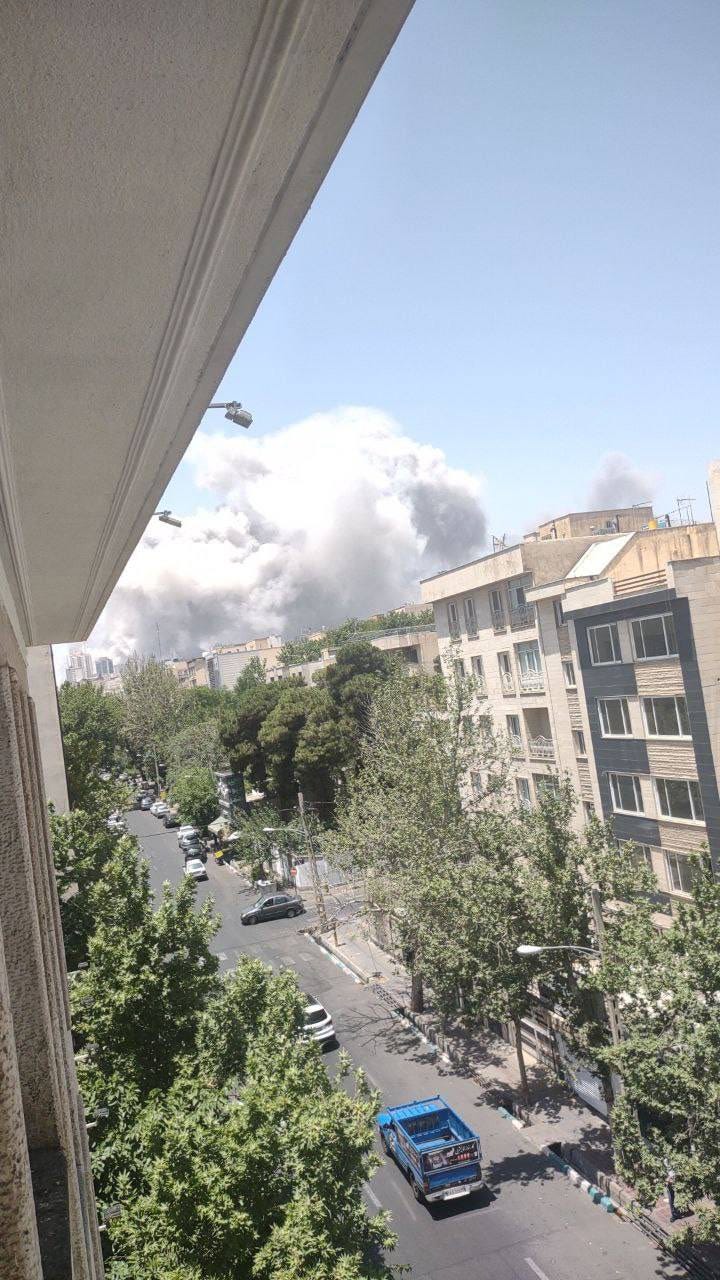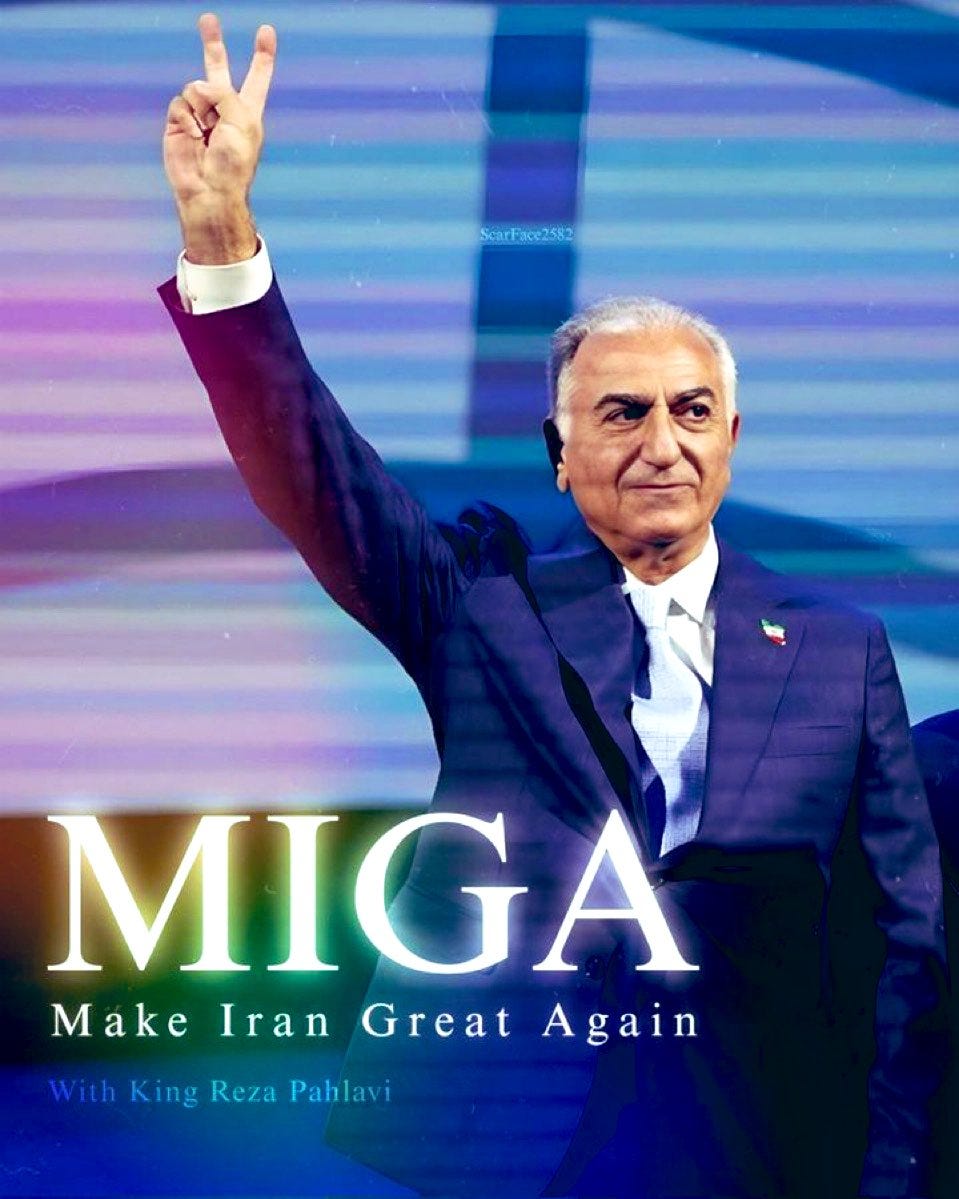War in Iran Diary-Entry 2
Random Thoughts on the Day After the Bombs Fell and the Bombs Continued to Fall
As I write these words a loud boom has gone off in Tehran. It's almost 1:00 pm over there. People are reporting that in central Tehran they can see thick white smoke near their house; like a cloud, one of them describes it.1 A strange sound someone says and then the electricity went out. Last night was the first night after the US bombed Iran and not many people have slept. For hours, they could hear the sound of anti-aircraft missiles in the sky. Someone else says it felt like the loudest night since the war began. Another person calls it the worse day of their lives.
As I write these words it's becoming clearer that today, Israeli bombs have fallen on a university, police headquarters and Evin prison. A video shows an explosion ripping apart the familiar entrance to Iran's most notorious prison.
Some say it was a symbolic act by Israel: On social media supporters of the monarchy2 posted the moment of explosion with the hashtag MIGA, Make Iran Great Again (more on that later). Others point out that the entrance is close to where families visiting their loved ones in prison go through. A political prisoner called his son to let him know that the windows in their ward were shattered.3
The nature of this war is summed up in this moment: How can you not rejoice in the bombardment of a prison that since its inception in 1971 has been synonymous with the brutality of both the Pahlavi monarchy and the Islamic Republic of Iran?4 Yet how can you rejoice at the bombardment of a prison full of helpless people with nowhere to go?
Yesterday, I woke up to what felt like a million texts all of which in two languages were variations of fuuuuuuuuuuck! The US bombed Iran!
For those inside Iran, the initial reaction was wondering whether a radioactive fallout from bombing Fordo, which is over 200 kilometers from Tehran, was going to reach them. No one knew. Rumors began to spread as to whether the US really did take out the site. How come no one in Qom, the city close to Fordo, heard any explosions, someone asks. No one knew. What they did know is that it was a relatively quiet night in Tehran; what they did know is that a lot of people were coming back to the city; some even went back to work.
So much for evacuation. When I frantically ask a friend if they’re in Tehran, they tell me they’d left for a small town far away. But, they added, they were going back to Tehran in a couple of days. “Naghmeh joon,” they say, “we’re just here to calm our nerves. Who can stay away from their home for too long?”
Sunday morning, I woke up and, I won't lie, I didn't and couldn't feel anything. Every feeling felt trite. I thought I should put on my analytical cap but nothing came. As I told a friend who called me from Iran to ask what I think will happen: I don’t know. How can one analyze—an inherently logical act—the actions of a bunch of irrational people? “Dude,” they laughed “just tell me do I need to stock up on supplies?”
I went to Twitter and I chuckled at some jokes people had posted. Mostly wordplay with B2, which in Persian can be made to sound like “without you.” My favorite one was simple, a line of poetry so many of us know by heart: The first line of Fereydoun Moshiri’s The Alley.
B2 مهتاب شبی، باز از فردو گذشتم
Coffee, the sweet nectar of the gods, worked its way through me and I was flooded with unexpected memories. I thought of the man who pounded his fists on the table and compared Iran to Nazi Germany 15 years ago. I thought of the American who called Iran irrational and emotional at a panel and then two sentences later based his analysis on the fact that “Iranians babbled” and were “untrustworthy.” I thought of the time that I was asked: “How can we trust Iran when Iranians believe in the cult of death?” I remembered how I couldn't formulate an answer on the spot. Not because I didn't have an answer but because the speaker seemed so deeply to believe in such a preposterous statement that disproving it would have taken more time than I had.
Weirdly I also thought of the 1985 movie Into the Night where Jeff Goldblum and Michelle Pfeiffer are on the run from SAVAK thugs because they'd stolen the Shah’s sister’s emeralds. A bizarre movie made only five years after the revolution. I don't remember much of the movie except that at the end of it Goldblum and Pfeiffer come face to face with the Shah's sister played by Irene Papas. My mother loved Irene Papas because she’d been in the movie Zorba the Greek. Every time she would hear the iconic song of Zorba’s Dance, her face would just open up and brighten as if she was there on an island in the Mediterranean, basking in the sun and dancing with Anthony Quinn. I think she loved it so much back then because it was the furthest thing she could think of from 1980s war-torn Iran.
I'd seen Into the Night in Iran in the 1980s. It was a black-market VHS tape that my uncle, who was lucky enough to have a video player, had rented. I think the movie stayed with me because it was the first time I was confronted by Hollywood stereotypes of Iranians and to be honest, the stereotype both delighted and puzzled me. Delighted because even today every time two words of Persian are peppered into an English language movie, I feel like pumping my fist and saying we made it! And there was plenty of Persian peppered throughout that movie, mostly if I recall correctly curses like son of a dog. But I was also puzzled because...well that should be obvious. The Iranians had a crazy look in their eyes running after these two beautiful white people, and that, even to my early teen eyes sitting in Tehran, did not bode well for our future.
Memory is a strange thing.
BBC Persian announced on Sunday, the same day that the US bombed Iran, a second man was executed by the Iranian government for working with Mossad; for treason. Today, Monday, a third man was executed. Executing 3 men in 11 days. The cruelty of the Islamic Republic once again on display. (It’s not that hard to be against a cruel political system and against this war.)
In the early days of the war when the biggest rumor was that the drones dropping bombs on Iran had been planted by Israel in advance, people started pointing fingers at the much-maligned Afghan refugees as a fifth column. Since the Soviet invasion of Afghanistan, Iran has hosted multiple waves of Afghan refugees. “The Afghan migrant community in Iran is estimated at 5-8 million individuals, which amounts to roughly 5,5-8,7% of the total population of c. 92 million.”5 Growing up in 1980s Iran, us kids were told if we didn’t behave, the monsters, i.e. the Afghans would come and eat us. Iranians are not immune to the anti-migrant winds in this world. Afghans sold out Iran to the Israelis is another iteration of it.
Later in the day after the US vice president said that America is not at war with Iran but with its nuclear program, the American president truthed:
“It’s not politically correct to use the term, ‘Regime Change,’ but if the current Iranian Regime is unable to MAKE IRAN GREAT AGAIN, why wouldn’t there be a Regime change??? MIGA!!!”
The hashtag MIGA began trending on social media pushed by those seeking a return of monarchy to Iran and cheering for Israel and the United states to end the Islamic Republic. But there's one major flaw with MIGA. If you ask anyone in Persian “are you MIGA?” you would have to say می گایی؟ which means in Persian “Are you f*&$ing?” When my best friend in the world texted me about how scary things were today—the explosions, the clouds of smoke, the shaking of the earth--I told her: Let me tell you a joke. And I did. It was good to laugh.
These are the true things for today. More to come soon or later who knows?
https://x.com/parspersian/status/1937072219055886656
To learn more about the son of Iran’s deposed Shah who has been advocating a bomb-based regime change in Iran read: https://jacobin.com/2025/06/reza-pahlavi-iran-israel-intervention/
https://x.com/rendahmad/status/1937071074858115476
For a fantastic discussion of Evin and other Iranian prisons, listen to this podcast with the historian Golnar Nikpour:
https://www.clingendael.org/publication/between-inclusion-and-exclusion-irans-selective-instrumentalization-afghan-migrants




Thank you Naghmeh, a wonderful read as always, and some much-needed hilarity! I can’t even imagine the stress-levels right now. I hope writing these centers you as much as it delights us, your readers.
Been thinking about you and glad to have your words as always. 💜